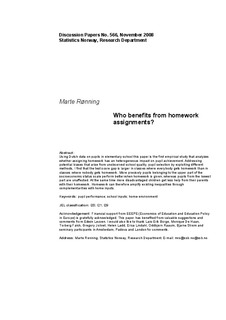| dc.contributor.author | Rønning, Marte | |
| dc.date.accessioned | 2011-10-31T22:40:59Z | |
| dc.date.available | 2011-10-31T22:40:59Z | |
| dc.date.issued | 2008 | |
| dc.identifier.issn | 1892-753x | |
| dc.identifier.uri | http://hdl.handle.net/11250/180393 | |
| dc.description.abstract | Abstract:
Using Dutch data on pupils in elementary school this paper is the first empirical study that analyzes whether assigning homework has an heterogeneous impact on pupil achievement. Addressing potential biases that arise from unobserved school quality, pupil selection by exploiting different methods, I find that the test score gap is larger in classes where everybody gets homework than in classes where nobody gets homework. More precisely pupils belonging to the upper part of the socioeconomic status scale perform better when homework is given, whereas pupils from the lowest part are unaffected. At the same time more disadvantaged children get less help from their parents with their homework. Homework can therefore amplify existing inequalities through complementarities with home inputs. | no_NO |
| dc.description.sponsorship | Financial support from EEEPE (Economics of Education and Education Policy in Europe) is gratefully acknowledged. | no_NO |
| dc.language.iso | eng | no_NO |
| dc.publisher | Statistics Norway | no_NO |
| dc.relation.ispartofseries | Discussion Papers;No. 566 | |
| dc.subject | Utdanning | no_NO |
| dc.subject | Lekser | no_NO |
| dc.subject | Elever | no_NO |
| dc.subject | Skoleresultater | no_NO |
| dc.subject | Pupil performance | no_NO |
| dc.subject | Elementary school | no_NO |
| dc.subject | Homework assignments | no_NO |
| dc.subject | JEL classification: I20 | no_NO |
| dc.subject | JEL classification: I21 | no_NO |
| dc.subject | JEL classification: I29 | no_NO |
| dc.title | Who benefits from homework assignments? | no_NO |
| dc.type | Working paper | no_NO |
| dc.subject.nsi | VDP::Social science: 200::Education: 280::General education: 281 | no_NO |
| dc.source.pagenumber | 29 s. | no_NO |
